What Is Idea Screening in Market Research? Use Cases & Best Practices
What Is Idea Screening in Market Research? Use Cases & Best Practices
What Is Idea Screening in Market Research? Use Cases & Best Practices



What Is Idea Screening in Market Research? Use Cases & Best Practices
In market research, idea screening serves as the gatekeeper of innovation, meticulously separating promising concepts from fleeting fads. It's a strategic process where market research agencies evaluate and prioritize ideas based on criteria like feasibility, market potential, and alignment with strategic goals. Idea screening isn't just about picking winners—it's about ensuring that resources are allocated wisely, risks are mitigated, and opportunities for growth are maximized. By embracing this systematic approach, market research agencies not only refine their product development strategies and marketing campaigns but also enhance their overall competitiveness in dynamic market landscapes.
In this blogpost, we explore what is idea screening, its diverse applications across industries, uncovering practical use cases and best practices that empower market research agencies to harness creativity, drive informed decisions, and pave the way for enduring success.
Defining Idea Screening: Beyond the Spark
At its heart, idea screening is the art of separating the promising sparks of creativity from the fleeting whimsies of imagination. It's a systematic process that evaluates and prioritizes ideas based on predefined criteria to determine their feasibility, market potential, and alignment with strategic goals. Think of it as a discerning eye that sifts through a haystack of ideas to find the needle—the one that not only fits but shines.
Practical Applications: Where Ideas Take Flight
1. Product Development: Crafting Tomorrow's Innovations
In the realm of product development, idea screening plays matchmaker between innovative concepts and consumer desires. Imagine a tech startup with a treasure trove of app ideas; idea screening helps pinpoint which ones are technically feasible, financially viable, and poised to captivate the market. It’s about turning blue-sky concepts into tangible products that meet real-world needs.
2. Marketing Campaigns: Winning Hearts and Minds
For marketers, idea screening ensures that campaigns hit the bullseye. It's not just about catchy slogans and eye-catching visuals—it's about resonating with target audiences on a profound level. By scrutinizing campaign ideas against customer insights, brand values, and market trends, marketers can optimize resources and orchestrate campaigns that leave a lasting impact.
3. Business Strategy: Navigating the Future
In the boardrooms of corporate strategy, idea screening guides decisions that shape the future of organizations. Whether exploring new markets or refining existing strategies, businesses rely on idea screening to assess risks, seize opportunities, and chart a course towards sustainable growth. It's strategic foresight in action, ensuring that every move is calculated and poised for success.
Best Practices: Unveiling the Art of Effective Idea Screening
1. Establish Clear Evaluation Criteria: The Roadmap to Success
Clarity is key. Define specific criteria—such as market potential, feasibility, and alignment with organizational goals—that ideas must meet. This creates a structured framework for evaluation, ensuring that decisions are grounded in strategic objectives rather than whimsical impulses.
2. Involve Cross-Functional Teams: Strength in Diversity
Great minds think alike, but diverse minds think innovatively. Bring together a mix of talents—from marketing mavens to tech whizzes—to evaluate ideas from every angle. This collaborative approach enriches the screening process with varied perspectives and deep insights, paving the way for robust decision-making.
3. Prioritize Customer Insights: The Voice of Reason
Who knows best? Your customers. Embed customer feedback, market research data, and behavioral insights into the screening process. Validate ideas against real-world needs and desires to ensure they resonate with your target audience—a crucial step in transforming ideas into profitable ventures.
4. Conduct Preliminary Market Research: Know Before You Leap
Before diving headfirst into development, dip your toes in the waters of market research. Gather data on market trends, competitor activities, and regulatory landscapes to gauge idea feasibility and anticipate potential challenges. Knowledge is power—it guides informed decisions and mitigates risks.
5. Use Quantitative and Qualitative Methods: Balancing Art and Science
Numbers tell a story, but emotions paint a picture. Blend quantitative analysis—through surveys and statistical models—with qualitative insights gained from focus groups and interviews. This dual approach illuminates different facets of idea viability, providing a comprehensive view for decision-makers.
6. Embrace Iterative Evaluation: Flexibility Fuels Innovation
The journey doesn’t end at the first evaluation. Embrace iteration by refining evaluation criteria and processes based on ongoing feedback. As new insights emerge and market dynamics shift, adaptability ensures that your screening efforts remain relevant and responsive.
7. Foster a Culture of Innovation: Nurturing Ideas, Nurturing Growth
Innovation thrives in an environment that values creativity and champions experimentation. Foster a culture where team members feel empowered to generate, explore, and refine ideas. Celebrate successes, learn from failures, and cultivate an ethos where innovation is not just encouraged but ingrained.
Leveraging Technology: AI's Role in Idea Screening
In the age of digital transformation, AI steps onto the stage as a game-changer in idea screening. AI-powered survey builders like Metaforms automate repetitive tasks, analyze vast datasets, and predict market trends with unprecedented accuracy. By leveraging AI, organizations enhance the speed, efficiency, and objectivity of their screening processes, unlocking hidden potentials and driving innovation forward.
Enhancing Efficiency through Automation
AI-powered tools streamline the idea screening process by automating repetitive tasks, such as initial idea evaluation and data analysis. Natural language processing (NLP) algorithms sift through vast amounts of textual data from surveys, social media, and customer feedback, extracting key insights and trends with unprecedented speed and accuracy. This automation not only accelerates the screening process but also frees up human resources to focus on strategic decision-making and creative ideation.
Predictive Analytics and Decision Support
AI excels in predictive analytics, forecasting market trends, and consumer behavior patterns based on historical data. By leveraging machine learning algorithms, market research agencies can predict the success potential of ideas with greater precision, identifying early indicators of market acceptance or potential obstacles. This predictive capability empowers decision-makers to prioritize ideas with the highest likelihood of success, minimizing risks and maximizing return on investment.
Personalization and Adaptability
One of AI's greatest strengths lies in its ability to personalize the screening experience through advanced recommendation engines and adaptive algorithms. AI-driven survey platforms utilize smart skip logic to tailor survey questions based on participant responses, ensuring a more engaging and relevant experience. This personalization not only improves respondent satisfaction but also enhances data quality by focusing on pertinent information, thus refining the screening criteria dynamically based on real-time insights.
Real-Time Insights and Iterative Improvement
AI enables real-time monitoring and analysis of screening data, providing instant feedback on idea performance and market dynamics. This capability allows agencies to iterate and refine screening criteria on the fly, responding swiftly to changing market conditions or emerging opportunities. By continuously optimizing the screening process based on AI-driven insights, agencies can stay agile, adaptive, and ahead of the competition in capturing market trends and consumer preferences.
Ethical Considerations and Bias Mitigation
While AI offers significant advantages in idea screening, it also raises ethical considerations, particularly around data privacy and algorithmic bias. Market research agencies must uphold ethical standards by ensuring transparency in data usage, protecting participant privacy, and regularly auditing AI algorithms for bias. By fostering ethical AI practices, agencies can build trust with stakeholders and maintain credibility in their research findings.
Future Prospects: AI-Driven Innovation in Market Research
Looking ahead, AI holds immense promise in pushing the boundaries of idea screening further. Advancements in AI technologies, including deep learning and predictive modeling, will continue to refine and optimize screening processes, uncovering insights that were previously inaccessible. As AI becomes more integrated into market research workflows, agencies can expect to harness its full potential to innovate, differentiate, and deliver actionable intelligence that drives business success.
Conclusion: Where Ideas Meet Opportunity
In conclusion, AI is not merely transforming idea screening; it revolutionizes the way market research agencies innovate and strategize. Metaforms.ai’s capabilities in automation, predictive analytics, personalization, and real-time insights, agencies can elevate their idea screening processes to new heights of efficiency, accuracy, and strategic relevance. AI-driven innovation ensures that agencies remain at the forefront of industry trends, enabling them to uncover and capitalize on the next big ideas that will shape tomorrow's markets. As AI continues to evolve, its role in idea screening will undoubtedly be pivotal in driving sustainable growth and competitive advantage in the dynamic world of market research.
What Is Idea Screening in Market Research? Use Cases & Best Practices
In market research, idea screening serves as the gatekeeper of innovation, meticulously separating promising concepts from fleeting fads. It's a strategic process where market research agencies evaluate and prioritize ideas based on criteria like feasibility, market potential, and alignment with strategic goals. Idea screening isn't just about picking winners—it's about ensuring that resources are allocated wisely, risks are mitigated, and opportunities for growth are maximized. By embracing this systematic approach, market research agencies not only refine their product development strategies and marketing campaigns but also enhance their overall competitiveness in dynamic market landscapes.
In this blogpost, we explore what is idea screening, its diverse applications across industries, uncovering practical use cases and best practices that empower market research agencies to harness creativity, drive informed decisions, and pave the way for enduring success.
Defining Idea Screening: Beyond the Spark
At its heart, idea screening is the art of separating the promising sparks of creativity from the fleeting whimsies of imagination. It's a systematic process that evaluates and prioritizes ideas based on predefined criteria to determine their feasibility, market potential, and alignment with strategic goals. Think of it as a discerning eye that sifts through a haystack of ideas to find the needle—the one that not only fits but shines.
Practical Applications: Where Ideas Take Flight
1. Product Development: Crafting Tomorrow's Innovations
In the realm of product development, idea screening plays matchmaker between innovative concepts and consumer desires. Imagine a tech startup with a treasure trove of app ideas; idea screening helps pinpoint which ones are technically feasible, financially viable, and poised to captivate the market. It’s about turning blue-sky concepts into tangible products that meet real-world needs.
2. Marketing Campaigns: Winning Hearts and Minds
For marketers, idea screening ensures that campaigns hit the bullseye. It's not just about catchy slogans and eye-catching visuals—it's about resonating with target audiences on a profound level. By scrutinizing campaign ideas against customer insights, brand values, and market trends, marketers can optimize resources and orchestrate campaigns that leave a lasting impact.
3. Business Strategy: Navigating the Future
In the boardrooms of corporate strategy, idea screening guides decisions that shape the future of organizations. Whether exploring new markets or refining existing strategies, businesses rely on idea screening to assess risks, seize opportunities, and chart a course towards sustainable growth. It's strategic foresight in action, ensuring that every move is calculated and poised for success.
Best Practices: Unveiling the Art of Effective Idea Screening
1. Establish Clear Evaluation Criteria: The Roadmap to Success
Clarity is key. Define specific criteria—such as market potential, feasibility, and alignment with organizational goals—that ideas must meet. This creates a structured framework for evaluation, ensuring that decisions are grounded in strategic objectives rather than whimsical impulses.
2. Involve Cross-Functional Teams: Strength in Diversity
Great minds think alike, but diverse minds think innovatively. Bring together a mix of talents—from marketing mavens to tech whizzes—to evaluate ideas from every angle. This collaborative approach enriches the screening process with varied perspectives and deep insights, paving the way for robust decision-making.
3. Prioritize Customer Insights: The Voice of Reason
Who knows best? Your customers. Embed customer feedback, market research data, and behavioral insights into the screening process. Validate ideas against real-world needs and desires to ensure they resonate with your target audience—a crucial step in transforming ideas into profitable ventures.
4. Conduct Preliminary Market Research: Know Before You Leap
Before diving headfirst into development, dip your toes in the waters of market research. Gather data on market trends, competitor activities, and regulatory landscapes to gauge idea feasibility and anticipate potential challenges. Knowledge is power—it guides informed decisions and mitigates risks.
5. Use Quantitative and Qualitative Methods: Balancing Art and Science
Numbers tell a story, but emotions paint a picture. Blend quantitative analysis—through surveys and statistical models—with qualitative insights gained from focus groups and interviews. This dual approach illuminates different facets of idea viability, providing a comprehensive view for decision-makers.
6. Embrace Iterative Evaluation: Flexibility Fuels Innovation
The journey doesn’t end at the first evaluation. Embrace iteration by refining evaluation criteria and processes based on ongoing feedback. As new insights emerge and market dynamics shift, adaptability ensures that your screening efforts remain relevant and responsive.
7. Foster a Culture of Innovation: Nurturing Ideas, Nurturing Growth
Innovation thrives in an environment that values creativity and champions experimentation. Foster a culture where team members feel empowered to generate, explore, and refine ideas. Celebrate successes, learn from failures, and cultivate an ethos where innovation is not just encouraged but ingrained.
Leveraging Technology: AI's Role in Idea Screening
In the age of digital transformation, AI steps onto the stage as a game-changer in idea screening. AI-powered survey builders like Metaforms automate repetitive tasks, analyze vast datasets, and predict market trends with unprecedented accuracy. By leveraging AI, organizations enhance the speed, efficiency, and objectivity of their screening processes, unlocking hidden potentials and driving innovation forward.
Enhancing Efficiency through Automation
AI-powered tools streamline the idea screening process by automating repetitive tasks, such as initial idea evaluation and data analysis. Natural language processing (NLP) algorithms sift through vast amounts of textual data from surveys, social media, and customer feedback, extracting key insights and trends with unprecedented speed and accuracy. This automation not only accelerates the screening process but also frees up human resources to focus on strategic decision-making and creative ideation.
Predictive Analytics and Decision Support
AI excels in predictive analytics, forecasting market trends, and consumer behavior patterns based on historical data. By leveraging machine learning algorithms, market research agencies can predict the success potential of ideas with greater precision, identifying early indicators of market acceptance or potential obstacles. This predictive capability empowers decision-makers to prioritize ideas with the highest likelihood of success, minimizing risks and maximizing return on investment.
Personalization and Adaptability
One of AI's greatest strengths lies in its ability to personalize the screening experience through advanced recommendation engines and adaptive algorithms. AI-driven survey platforms utilize smart skip logic to tailor survey questions based on participant responses, ensuring a more engaging and relevant experience. This personalization not only improves respondent satisfaction but also enhances data quality by focusing on pertinent information, thus refining the screening criteria dynamically based on real-time insights.
Real-Time Insights and Iterative Improvement
AI enables real-time monitoring and analysis of screening data, providing instant feedback on idea performance and market dynamics. This capability allows agencies to iterate and refine screening criteria on the fly, responding swiftly to changing market conditions or emerging opportunities. By continuously optimizing the screening process based on AI-driven insights, agencies can stay agile, adaptive, and ahead of the competition in capturing market trends and consumer preferences.
Ethical Considerations and Bias Mitigation
While AI offers significant advantages in idea screening, it also raises ethical considerations, particularly around data privacy and algorithmic bias. Market research agencies must uphold ethical standards by ensuring transparency in data usage, protecting participant privacy, and regularly auditing AI algorithms for bias. By fostering ethical AI practices, agencies can build trust with stakeholders and maintain credibility in their research findings.
Future Prospects: AI-Driven Innovation in Market Research
Looking ahead, AI holds immense promise in pushing the boundaries of idea screening further. Advancements in AI technologies, including deep learning and predictive modeling, will continue to refine and optimize screening processes, uncovering insights that were previously inaccessible. As AI becomes more integrated into market research workflows, agencies can expect to harness its full potential to innovate, differentiate, and deliver actionable intelligence that drives business success.
Conclusion: Where Ideas Meet Opportunity
In conclusion, AI is not merely transforming idea screening; it revolutionizes the way market research agencies innovate and strategize. Metaforms.ai’s capabilities in automation, predictive analytics, personalization, and real-time insights, agencies can elevate their idea screening processes to new heights of efficiency, accuracy, and strategic relevance. AI-driven innovation ensures that agencies remain at the forefront of industry trends, enabling them to uncover and capitalize on the next big ideas that will shape tomorrow's markets. As AI continues to evolve, its role in idea screening will undoubtedly be pivotal in driving sustainable growth and competitive advantage in the dynamic world of market research.
What Is Idea Screening in Market Research? Use Cases & Best Practices
In market research, idea screening serves as the gatekeeper of innovation, meticulously separating promising concepts from fleeting fads. It's a strategic process where market research agencies evaluate and prioritize ideas based on criteria like feasibility, market potential, and alignment with strategic goals. Idea screening isn't just about picking winners—it's about ensuring that resources are allocated wisely, risks are mitigated, and opportunities for growth are maximized. By embracing this systematic approach, market research agencies not only refine their product development strategies and marketing campaigns but also enhance their overall competitiveness in dynamic market landscapes.
In this blogpost, we explore what is idea screening, its diverse applications across industries, uncovering practical use cases and best practices that empower market research agencies to harness creativity, drive informed decisions, and pave the way for enduring success.
Defining Idea Screening: Beyond the Spark
At its heart, idea screening is the art of separating the promising sparks of creativity from the fleeting whimsies of imagination. It's a systematic process that evaluates and prioritizes ideas based on predefined criteria to determine their feasibility, market potential, and alignment with strategic goals. Think of it as a discerning eye that sifts through a haystack of ideas to find the needle—the one that not only fits but shines.
Practical Applications: Where Ideas Take Flight
1. Product Development: Crafting Tomorrow's Innovations
In the realm of product development, idea screening plays matchmaker between innovative concepts and consumer desires. Imagine a tech startup with a treasure trove of app ideas; idea screening helps pinpoint which ones are technically feasible, financially viable, and poised to captivate the market. It’s about turning blue-sky concepts into tangible products that meet real-world needs.
2. Marketing Campaigns: Winning Hearts and Minds
For marketers, idea screening ensures that campaigns hit the bullseye. It's not just about catchy slogans and eye-catching visuals—it's about resonating with target audiences on a profound level. By scrutinizing campaign ideas against customer insights, brand values, and market trends, marketers can optimize resources and orchestrate campaigns that leave a lasting impact.
3. Business Strategy: Navigating the Future
In the boardrooms of corporate strategy, idea screening guides decisions that shape the future of organizations. Whether exploring new markets or refining existing strategies, businesses rely on idea screening to assess risks, seize opportunities, and chart a course towards sustainable growth. It's strategic foresight in action, ensuring that every move is calculated and poised for success.
Best Practices: Unveiling the Art of Effective Idea Screening
1. Establish Clear Evaluation Criteria: The Roadmap to Success
Clarity is key. Define specific criteria—such as market potential, feasibility, and alignment with organizational goals—that ideas must meet. This creates a structured framework for evaluation, ensuring that decisions are grounded in strategic objectives rather than whimsical impulses.
2. Involve Cross-Functional Teams: Strength in Diversity
Great minds think alike, but diverse minds think innovatively. Bring together a mix of talents—from marketing mavens to tech whizzes—to evaluate ideas from every angle. This collaborative approach enriches the screening process with varied perspectives and deep insights, paving the way for robust decision-making.
3. Prioritize Customer Insights: The Voice of Reason
Who knows best? Your customers. Embed customer feedback, market research data, and behavioral insights into the screening process. Validate ideas against real-world needs and desires to ensure they resonate with your target audience—a crucial step in transforming ideas into profitable ventures.
4. Conduct Preliminary Market Research: Know Before You Leap
Before diving headfirst into development, dip your toes in the waters of market research. Gather data on market trends, competitor activities, and regulatory landscapes to gauge idea feasibility and anticipate potential challenges. Knowledge is power—it guides informed decisions and mitigates risks.
5. Use Quantitative and Qualitative Methods: Balancing Art and Science
Numbers tell a story, but emotions paint a picture. Blend quantitative analysis—through surveys and statistical models—with qualitative insights gained from focus groups and interviews. This dual approach illuminates different facets of idea viability, providing a comprehensive view for decision-makers.
6. Embrace Iterative Evaluation: Flexibility Fuels Innovation
The journey doesn’t end at the first evaluation. Embrace iteration by refining evaluation criteria and processes based on ongoing feedback. As new insights emerge and market dynamics shift, adaptability ensures that your screening efforts remain relevant and responsive.
7. Foster a Culture of Innovation: Nurturing Ideas, Nurturing Growth
Innovation thrives in an environment that values creativity and champions experimentation. Foster a culture where team members feel empowered to generate, explore, and refine ideas. Celebrate successes, learn from failures, and cultivate an ethos where innovation is not just encouraged but ingrained.
Leveraging Technology: AI's Role in Idea Screening
In the age of digital transformation, AI steps onto the stage as a game-changer in idea screening. AI-powered survey builders like Metaforms automate repetitive tasks, analyze vast datasets, and predict market trends with unprecedented accuracy. By leveraging AI, organizations enhance the speed, efficiency, and objectivity of their screening processes, unlocking hidden potentials and driving innovation forward.
Enhancing Efficiency through Automation
AI-powered tools streamline the idea screening process by automating repetitive tasks, such as initial idea evaluation and data analysis. Natural language processing (NLP) algorithms sift through vast amounts of textual data from surveys, social media, and customer feedback, extracting key insights and trends with unprecedented speed and accuracy. This automation not only accelerates the screening process but also frees up human resources to focus on strategic decision-making and creative ideation.
Predictive Analytics and Decision Support
AI excels in predictive analytics, forecasting market trends, and consumer behavior patterns based on historical data. By leveraging machine learning algorithms, market research agencies can predict the success potential of ideas with greater precision, identifying early indicators of market acceptance or potential obstacles. This predictive capability empowers decision-makers to prioritize ideas with the highest likelihood of success, minimizing risks and maximizing return on investment.
Personalization and Adaptability
One of AI's greatest strengths lies in its ability to personalize the screening experience through advanced recommendation engines and adaptive algorithms. AI-driven survey platforms utilize smart skip logic to tailor survey questions based on participant responses, ensuring a more engaging and relevant experience. This personalization not only improves respondent satisfaction but also enhances data quality by focusing on pertinent information, thus refining the screening criteria dynamically based on real-time insights.
Real-Time Insights and Iterative Improvement
AI enables real-time monitoring and analysis of screening data, providing instant feedback on idea performance and market dynamics. This capability allows agencies to iterate and refine screening criteria on the fly, responding swiftly to changing market conditions or emerging opportunities. By continuously optimizing the screening process based on AI-driven insights, agencies can stay agile, adaptive, and ahead of the competition in capturing market trends and consumer preferences.
Ethical Considerations and Bias Mitigation
While AI offers significant advantages in idea screening, it also raises ethical considerations, particularly around data privacy and algorithmic bias. Market research agencies must uphold ethical standards by ensuring transparency in data usage, protecting participant privacy, and regularly auditing AI algorithms for bias. By fostering ethical AI practices, agencies can build trust with stakeholders and maintain credibility in their research findings.
Future Prospects: AI-Driven Innovation in Market Research
Looking ahead, AI holds immense promise in pushing the boundaries of idea screening further. Advancements in AI technologies, including deep learning and predictive modeling, will continue to refine and optimize screening processes, uncovering insights that were previously inaccessible. As AI becomes more integrated into market research workflows, agencies can expect to harness its full potential to innovate, differentiate, and deliver actionable intelligence that drives business success.
Conclusion: Where Ideas Meet Opportunity
In conclusion, AI is not merely transforming idea screening; it revolutionizes the way market research agencies innovate and strategize. Metaforms.ai’s capabilities in automation, predictive analytics, personalization, and real-time insights, agencies can elevate their idea screening processes to new heights of efficiency, accuracy, and strategic relevance. AI-driven innovation ensures that agencies remain at the forefront of industry trends, enabling them to uncover and capitalize on the next big ideas that will shape tomorrow's markets. As AI continues to evolve, its role in idea screening will undoubtedly be pivotal in driving sustainable growth and competitive advantage in the dynamic world of market research.
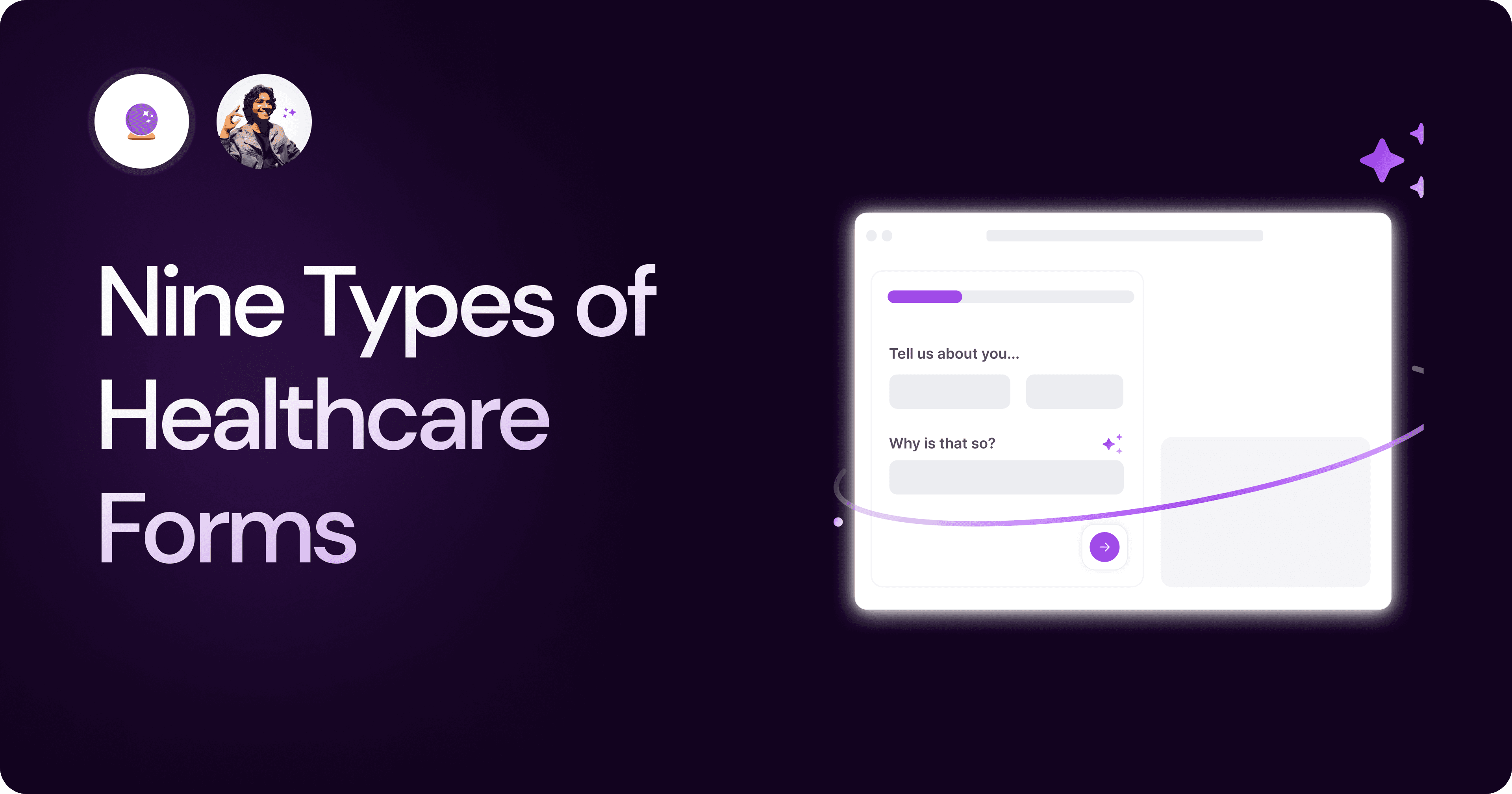
Nine Types of Healthcare and Medical Forms.
Medical forms are a must-have for any healthcare business or practitioner. Learn about the different kinds of medical and healthcare forms.
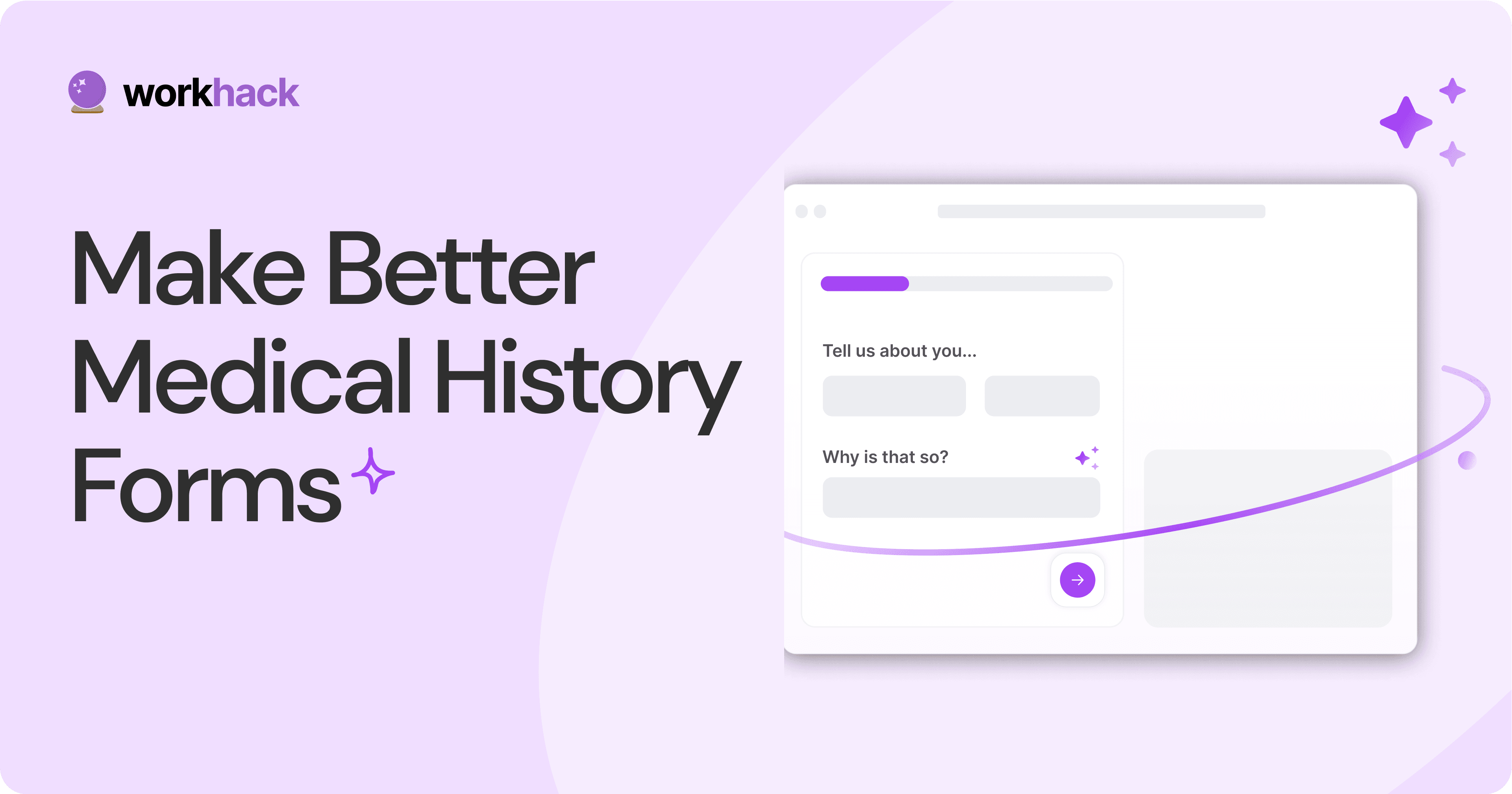
4 Tips for Better Medical History Forms.
Medical history forms are central to patient care, onboarding, and medical administration records. Learn how to make them easier to fill.
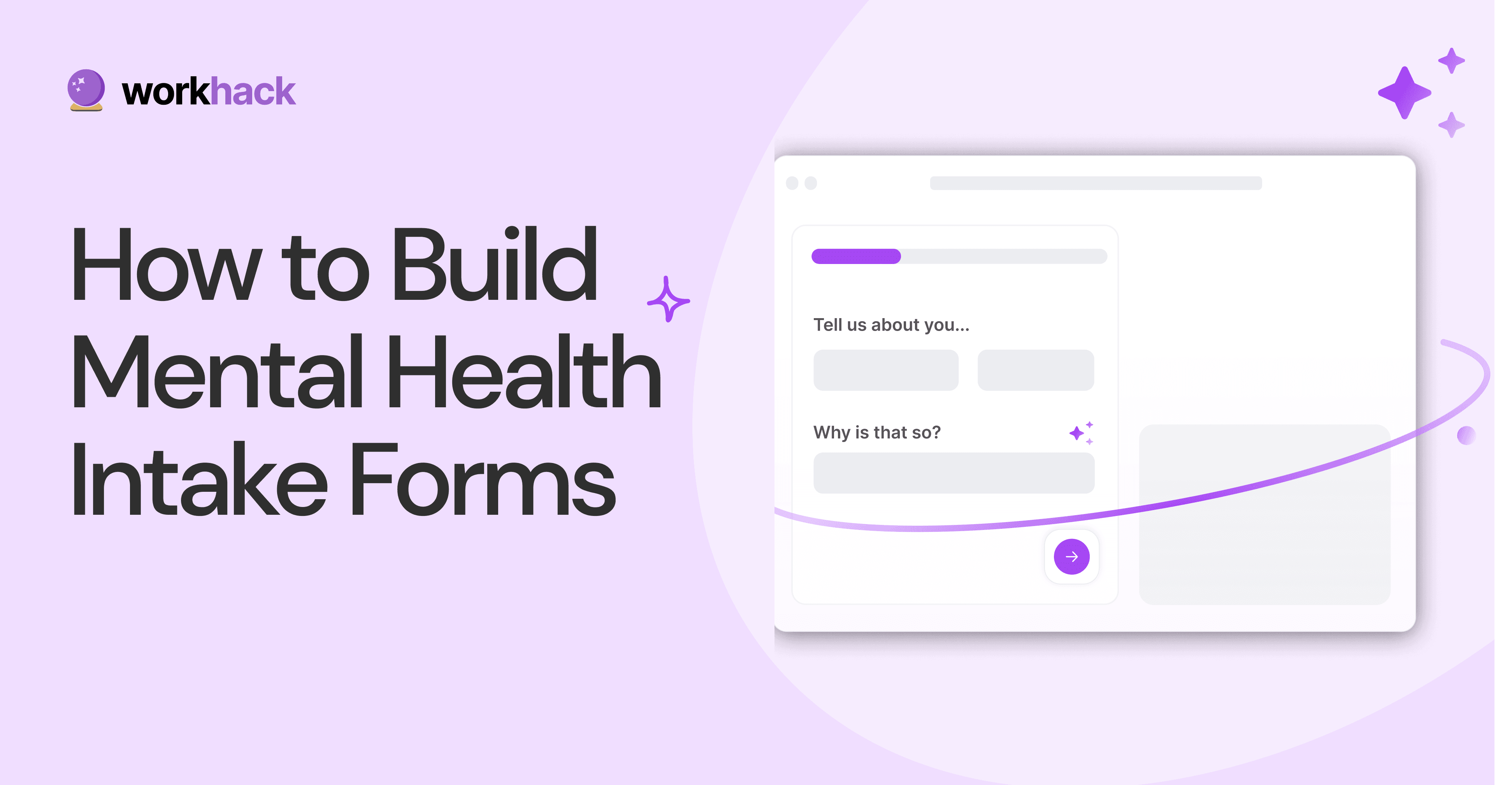
How to Build Mental Health Intake Forms?
Mental health intake forms are not like patient intake forms. Mental health intake forms deal with far more sensitive data and have specific design methods.
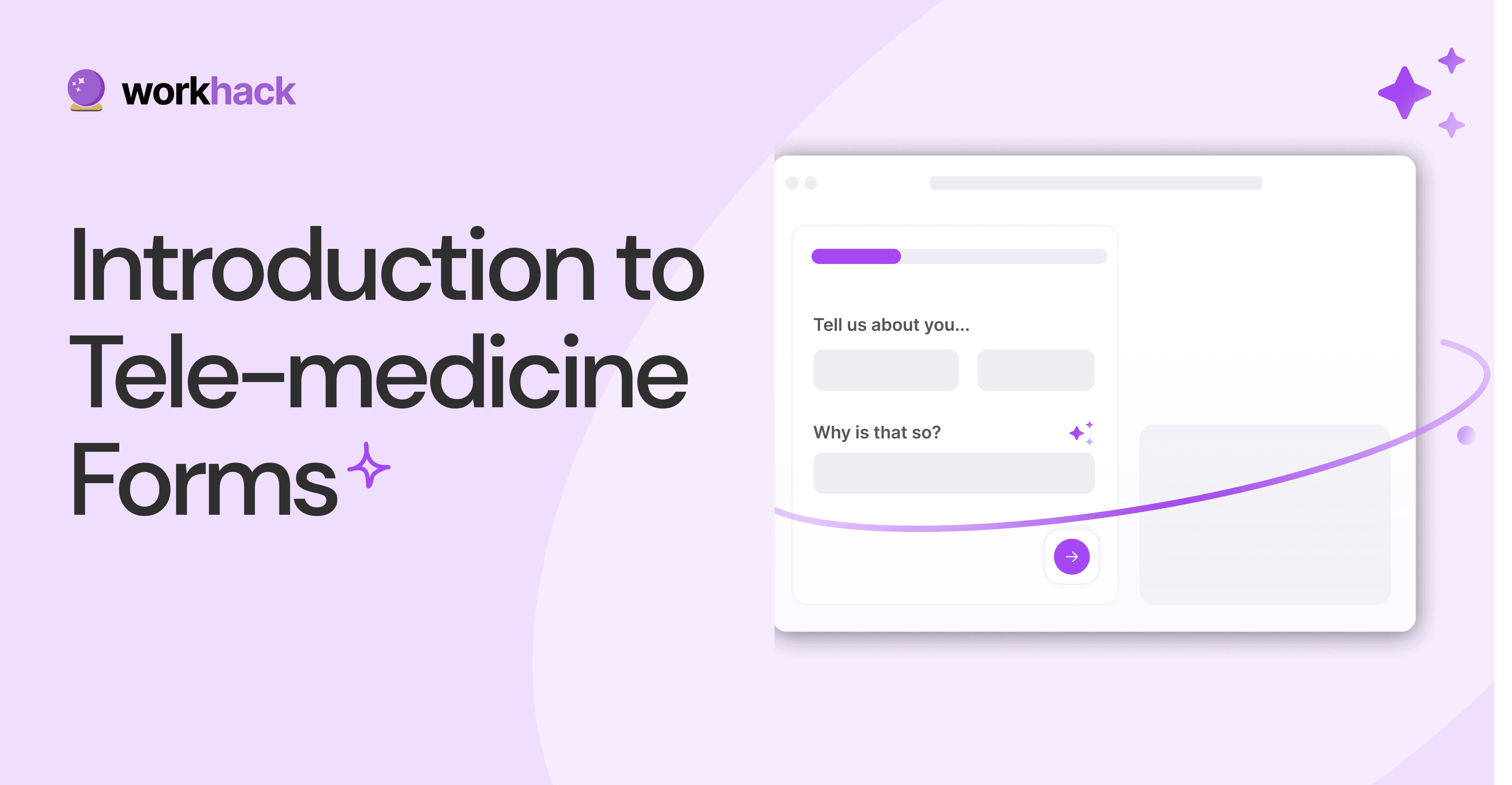
What, Why and How of Telemedicine Forms.
Telemedicine is on the rise and with different form builders out there, which one best suits your needs as a healthcare services provider?
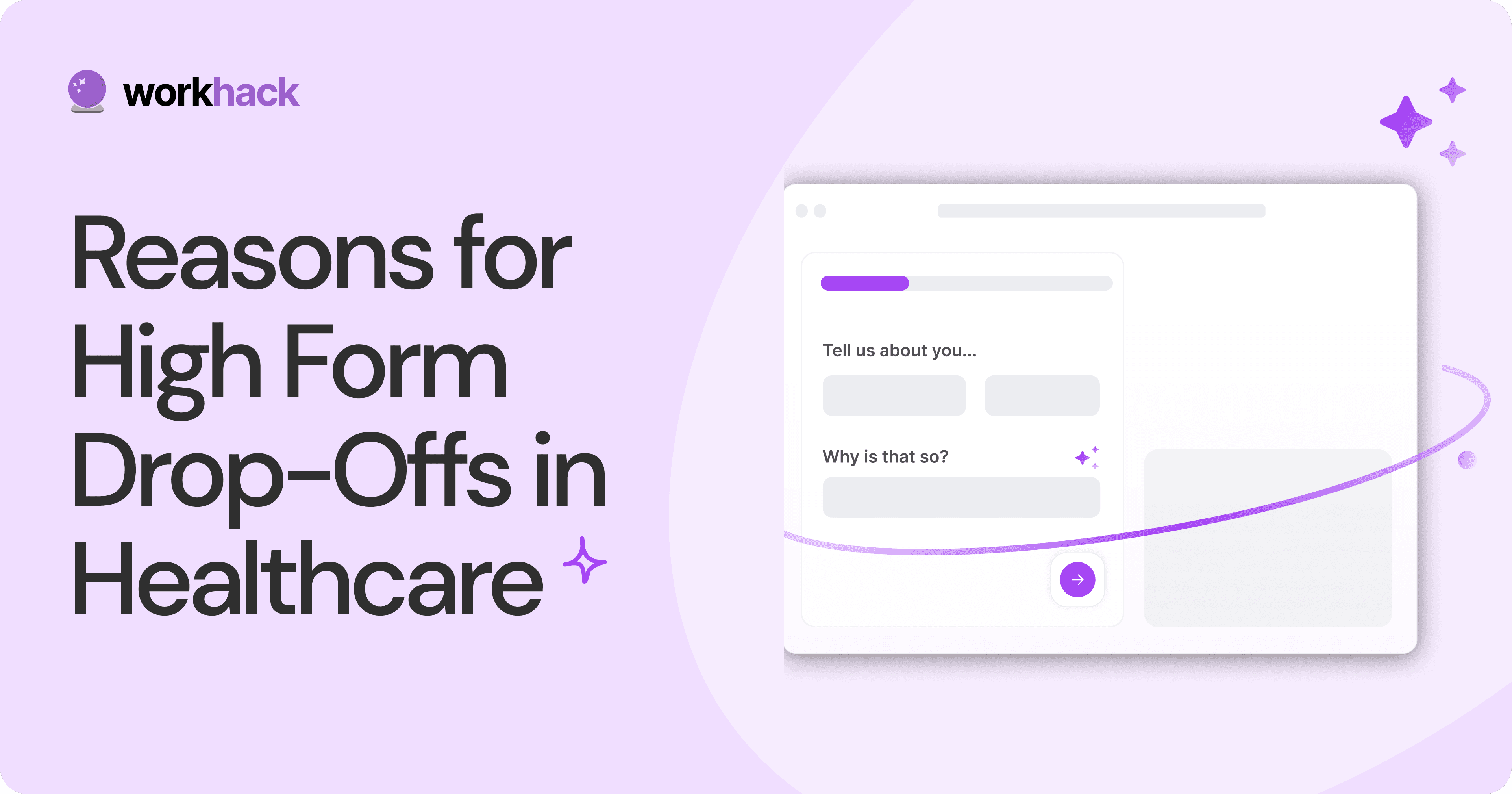
3 Reasons for Major Drop-Offs in Medical Forms.
No matter which healthcare form we pick, there are major drop-off reasons. We shall dive into the top 3 and learn how to resolve them in your next form.
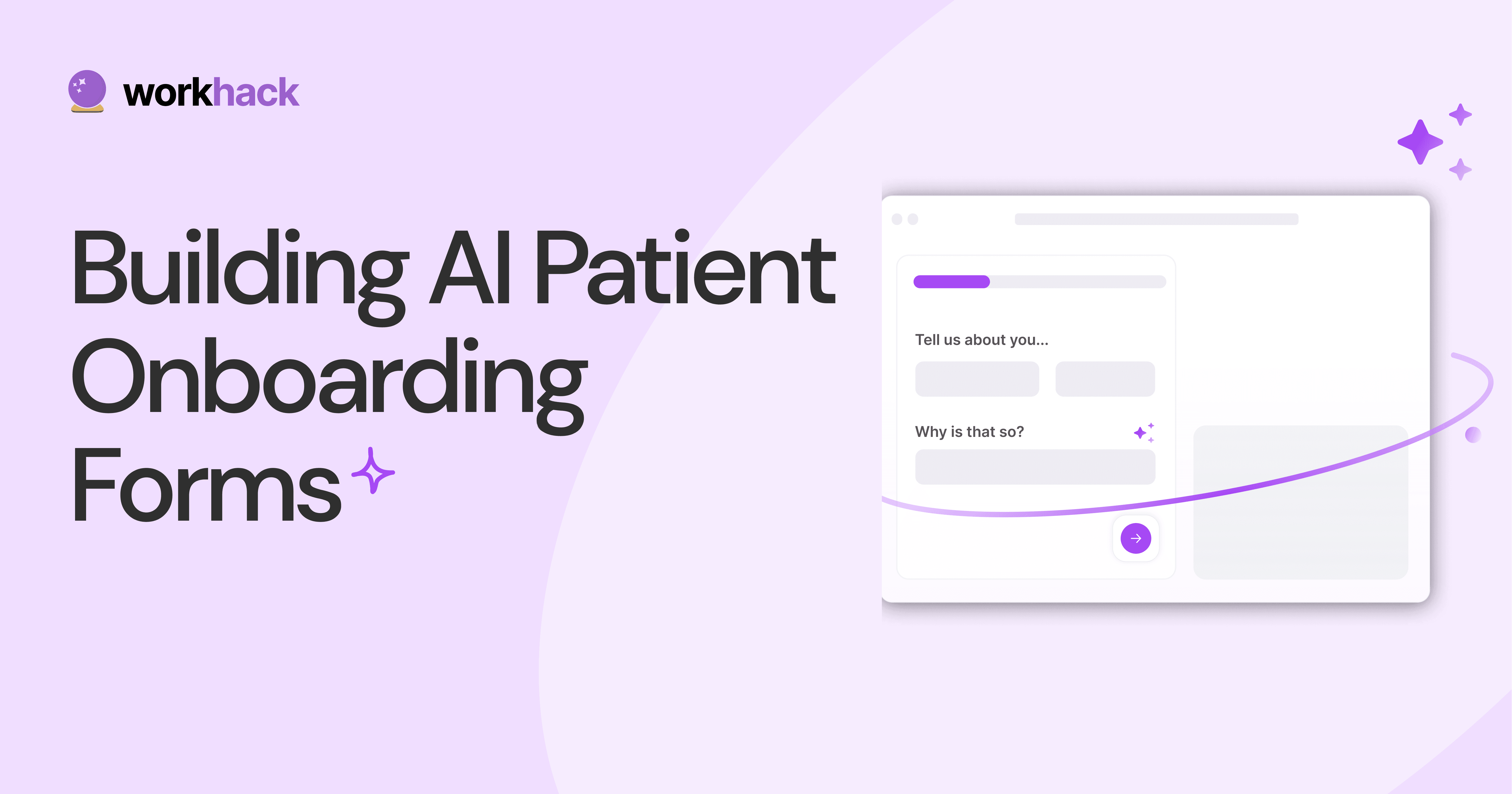
Patient Onboarding Forms - From Click to Clinic.
Patient onboarding forms are the first touchpoint for patients; getting this right for higher conversion rates is a must-have. Learn how to perfect them now.
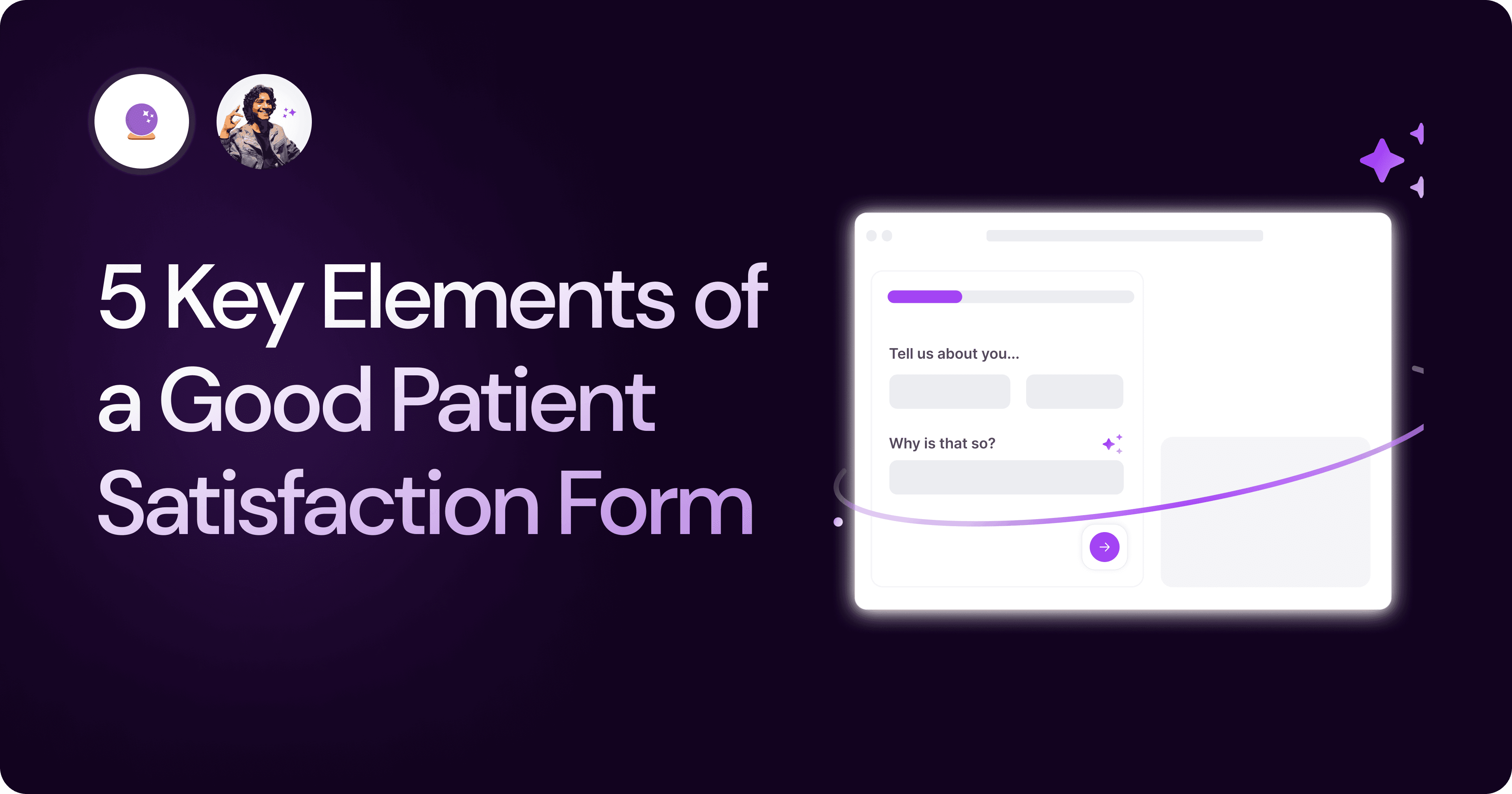
5 Key Parts of a Good Patient Satisfaction Form.
The goal of patient satisfaction surveys is to course-correct the services of a healthcare provider. Patient feedback leads to a culture of patient-centric care.
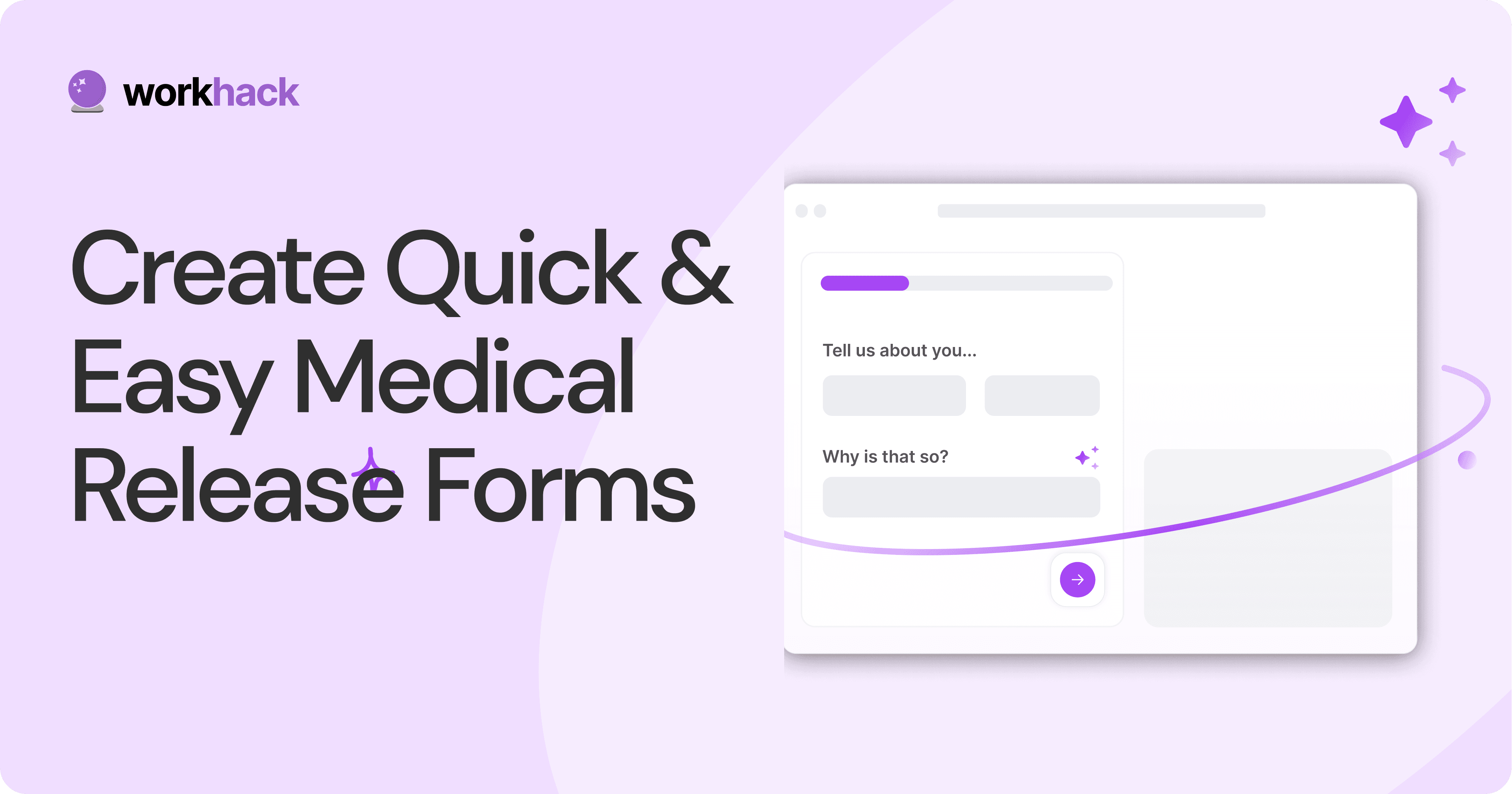
Build Quick and Easy Medical Release Forms.
Every HIPAA-compliant healthcare provider comes across medical release forms that involve details from medical history forms. Can they be shipped fast? Yes.

Nine Types of Healthcare and Medical Forms.
Medical forms are a must-have for any healthcare business or practitioner. Learn about the different kinds of medical and healthcare forms.

4 Tips for Better Medical History Forms.
Medical history forms are central to patient care, onboarding, and medical administration records. Learn how to make them easier to fill.

How to Build Mental Health Intake Forms?
Mental health intake forms are not like patient intake forms. Mental health intake forms deal with far more sensitive data and have specific design methods.

What, Why and How of Telemedicine Forms.
Telemedicine is on the rise and with different form builders out there, which one best suits your needs as a healthcare services provider?

3 Reasons for Major Drop-Offs in Medical Forms.
No matter which healthcare form we pick, there are major drop-off reasons. We shall dive into the top 3 and learn how to resolve them in your next form.

Patient Onboarding Forms - From Click to Clinic.
Patient onboarding forms are the first touchpoint for patients; getting this right for higher conversion rates is a must-have. Learn how to perfect them now.

5 Key Parts of a Good Patient Satisfaction Form.
The goal of patient satisfaction surveys is to course-correct the services of a healthcare provider. Patient feedback leads to a culture of patient-centric care.

Build Quick and Easy Medical Release Forms.
Every HIPAA-compliant healthcare provider comes across medical release forms that involve details from medical history forms. Can they be shipped fast? Yes.

Nine Types of Healthcare and Medical Forms.
Medical forms are a must-have for any healthcare business or practitioner. Learn about the different kinds of medical and healthcare forms.

4 Tips for Better Medical History Forms.
Medical history forms are central to patient care, onboarding, and medical administration records. Learn how to make them easier to fill.

How to Build Mental Health Intake Forms?
Mental health intake forms are not like patient intake forms. Mental health intake forms deal with far more sensitive data and have specific design methods.

What, Why and How of Telemedicine Forms.
Telemedicine is on the rise and with different form builders out there, which one best suits your needs as a healthcare services provider?

3 Reasons for Major Drop-Offs in Medical Forms.
No matter which healthcare form we pick, there are major drop-off reasons. We shall dive into the top 3 and learn how to resolve them in your next form.

Patient Onboarding Forms - From Click to Clinic.
Patient onboarding forms are the first touchpoint for patients; getting this right for higher conversion rates is a must-have. Learn how to perfect them now.

5 Key Parts of a Good Patient Satisfaction Form.
The goal of patient satisfaction surveys is to course-correct the services of a healthcare provider. Patient feedback leads to a culture of patient-centric care.

Build Quick and Easy Medical Release Forms.
Every HIPAA-compliant healthcare provider comes across medical release forms that involve details from medical history forms. Can they be shipped fast? Yes.

Nine Types of Healthcare and Medical Forms.
Medical forms are a must-have for any healthcare business or practitioner. Learn about the different kinds of medical and healthcare forms.

4 Tips for Better Medical History Forms.
Medical history forms are central to patient care, onboarding, and medical administration records. Learn how to make them easier to fill.

How to Build Mental Health Intake Forms?
Mental health intake forms are not like patient intake forms. Mental health intake forms deal with far more sensitive data and have specific design methods.

What, Why and How of Telemedicine Forms.
Telemedicine is on the rise and with different form builders out there, which one best suits your needs as a healthcare services provider?

3 Reasons for Major Drop-Offs in Medical Forms.
No matter which healthcare form we pick, there are major drop-off reasons. We shall dive into the top 3 and learn how to resolve them in your next form.

Patient Onboarding Forms - From Click to Clinic.
Patient onboarding forms are the first touchpoint for patients; getting this right for higher conversion rates is a must-have. Learn how to perfect them now.

5 Key Parts of a Good Patient Satisfaction Form.
The goal of patient satisfaction surveys is to course-correct the services of a healthcare provider. Patient feedback leads to a culture of patient-centric care.

Build Quick and Easy Medical Release Forms.
Every HIPAA-compliant healthcare provider comes across medical release forms that involve details from medical history forms. Can they be shipped fast? Yes.
Subscribe to stay updated.
Subscribe to stay updated.
Subscribe to stay updated.
HC

HC

HC
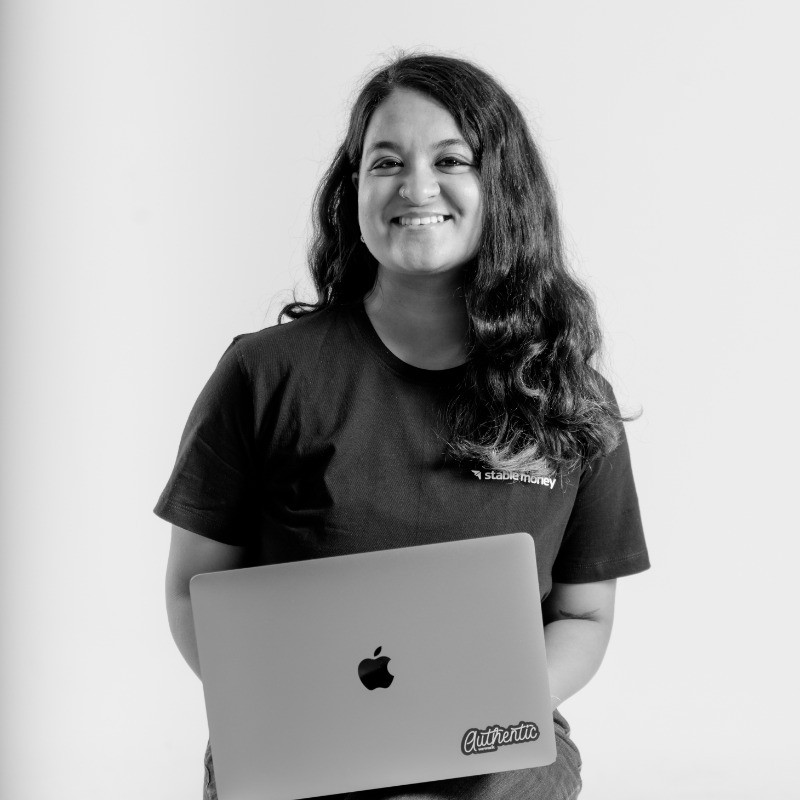
HC

70+ people from across industries read our emails.
HC

HC

70+ people from across industries read our emails.
HC

HC

HC

70+ people from across industries read our emails.




Bangalore, India / San Francisco, US
WorkHack Inc. 2023
Bangalore, India
San Francisco, US
WorkHack Inc. 2023
WorkHack Inc. 2023
Bangalore, India / San Francisco, US
WorkHack Inc. 2023
Bangalore, India / San Francisco, US


